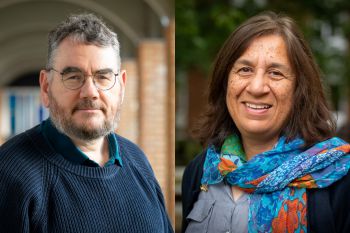Sussex academics awarded by Leverhulme Trust
Posted on behalf of: University of Sussex
Last updated: Tuesday, 14 January 2025

Professor Jim Endersby and Professor Maya Unnithan
Professor Maya Unnithan and Professor Jim Endersby have been awarded Leverhulme Trust major research fellowships.
Professor Jim Endersby, from the Faculty of Media, Arts and Humanities, has been awarded a Leverhulme Trust major research fellowship to explore how different groups, from mothers and progressive activists to spiritual thinkers, interpreted and used Darwin’s ideas - shedding new light on how scientific ideas shape culture, past and present.
His project titled Darwinian Fans: Reading, Responding to, and Reimagining Evolution, challenges the traditional view that science spreads only through experts and education. Instead, he reveals how people outside the scientific community, including many women, creatively adapted Darwin’s theories to fit their own beliefs.
The research builds on themes from his recently published book, The Arrival of the Fittest, which studies how an early 20th-century idea, Mutation Theory, captured the public imagination. These ideas helped shape stories that still resonate today, from Brave New World by Aldous Huxley to the X-Men movies.
Professor Endersby said: “As a historian of science, I have always been fascinated by understanding how science becomes part of public conversations and beliefs, given that most of us don’t understand very much about science.”
Professor Maya Unnithan, from the Faculty of Social Sciences, has also been awarded a Leverhulme Trust major research fellowship to explore the ethical, legal, and cultural dimensions of reproductive freedom, examining the right to reproduce and the right to avoid reproduction. While philosophers and feminist scholars have long studied reproductive rights, anthropology has not yet fully explored how these rights are shaped by different social, moral and legal systems.
Professor Unnithan’s project, titled Reproductive Freedom and Ethics: A Comparative Study on the Making of Self, will investigate how reproductive decisions are influenced by religious, legal, and ethical frameworks in cultural contexts. By analysing case law in the UK, US, and India, as well as religious and ethical perspectives on reproductive freedom, she aims to better understand how reproductive aspirations are framed and navigated.
Professor Maya Unnithan said: “I have worked for a long time on rights issues to do with the body, conception and contraception. Now I am really excited about exploring this through the idea of freedom which provides a broader moral and inclusive vision."
Dr Jonathan Moss and Dr Laura Morosanu from the Faculty of Social Sciences have also received Leverhulme Trust Research Project Grants.
Dr Moss has been awarded a two-year Leverhulme Research Project Grant for a project on The making of ‘grey power’: Political understandings over the life course - using Mass Observation Archive data to look at how political attitudes change over time.
Dr Morosanu has secured a Leverhulme Trust grant for Pathways to inclusion: Children of migrants navigating 'assaults on worth' - examining how migrant-origin youth establish a sense of worth and belonging in professional workplaces in Britain.
The Leverhulme Trust is an independent, London-based charity that provides grants and fellowships to support research and education, primarily in the UK. The Trust has been funding research for almost 100 years after being established in 1925 by the will of William Hesketh Lever, the founder of Lever Brothers.

